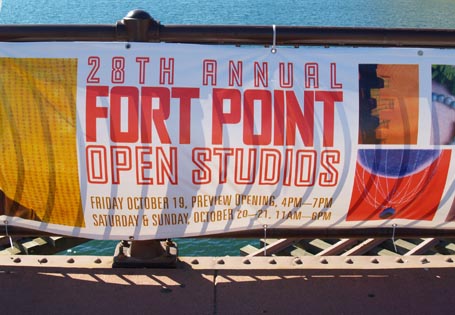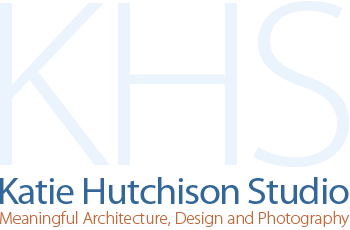 On a gorgeous Sunday afternoon, I had the pleasure of attending this diverse arts event housed in the adapted, historic, masonry warehouses of Boston’s Fort Point arts district. I’d never been before and was delighted by the chance to browse through all manner of artwork in some exquisite loft studios. Many were drenched with light, bordered by old brick, and topped with exposed rough-hewn wood beams, making the event as much a self-guided architectural tour as an arts happening.
On a gorgeous Sunday afternoon, I had the pleasure of attending this diverse arts event housed in the adapted, historic, masonry warehouses of Boston’s Fort Point arts district. I’d never been before and was delighted by the chance to browse through all manner of artwork in some exquisite loft studios. Many were drenched with light, bordered by old brick, and topped with exposed rough-hewn wood beams, making the event as much a self-guided architectural tour as an arts happening.
My time was limited, so I only touched on a few of the many offerings, but several caught my eye. I decided with my fellow tour companions to explore a large venue first, 249 A Street. There we found book artist Laura Davidson in a sunny spot with an eclectic display of her one-of-a-kind and limited edition books. Her Fenway Park “tunnel book” was a highlight. It’s a small, hand-assembled presentation of layered, pictorial pages that create a nostalgic, diorama-like view of the stadium and Boston skyline. (Her timing couldn't be better.) Paper mosaics titled the “Antiquities Series” likewise reveal her careful craftsmanship and taste for the muted tones we associate with the patina of age. Her work deftly manipulates paper to great three-dimensional effect.
In the same building, we also discovered photographer Don Eyles whose black and white photos of the Zakim bridge and other Big Dig sites are mesmerizing. They exhibit a complexity of overlapping and evolving infrastructure in rich, contrasting detail. Some of the more successful compositions render the specifics abstract and manipulate scale. At one point, my friend and I both thought we were looking at a photo of disheveled buildings that were awash, when what we were actually seeing was some abandoned, floating, wooden palettes shot against an urban skyline. Further, the tonal range of the photos is impressive, spanning jet black to oyster shell white. We agreed that for the right buyer, a sampling of the infrastructure photos would look great hung in a series.
Then we tucked into the smaller venue of 21 Wormwood Street. The photography and charcoal drawings of Wendy Shapiro were on display in a studio there. While she was out of town, Wendy’s parents acted as generous hosts, inviting visitors to peruse Wendy’s work, displayed throughout her living space. She too created some images of the Zakim bridge; hers are printed on canvas while some other Italian landmarks are printed on silk. The work looked great in place, and from an architectural standpoint, her studio was a knockout.
Another memorable studio in the same building exhibits the work of Kaarigar. Here, Richa Lodha shared some exquisite stoles that are hand-embroidered and handmade out of a gorgeous fabric called Khadi which, according to the Kaarigar website, is indigenous to India and “still…spun and woven by village cooperatives using hand-operated looms.” Discreetly placed Indian-inspired artifacts adorned the minimalist studio that featured an unusual galvanized, safe-like, interior door that we were told leads to the bedroom. The rugged, industrial space acts as an appealing foil to Kaarigar’s lush, intricate textiles.
One of my favorite stops was at the photography studio of Leslie Anne Feagley. She had multiple bins of affordable, small-scale, black and white photos for sale. They included travel scenes, streetscape vignettes, landscape details, and candid shots of people. She also offers boxed sets of note cards. Hanging free-form within the space was a larger installation piece of portraits and cityscapes that she created in response to her recent volunteer work to help rebuild after Hurricane Katrina. Though she doesn’t yet have a website for her work, it’s worth looking her up at Studio 305 at 21 Wormwood Street (617) 670-9490. I think you’ll find her as affable as we did.
For a change of pace, we closed out the afternoon in another one of the large venues, 15 Channel Center Street. There we happened upon a pleasant surprise, Dick and Jane Letterpress. As a fan of the minimal simplicity generally associated with letterpresses, I was tickled to find the humorous spin that husband-and-wife owners, Brian and Natalie Durk, have brought to the craft. I couldn’t leave without buying a few note cards: one that says “get well” with a small, rose-colored imprint of a scull & crossbones, and another that says “...sorry” with a small, blue-colored imprint of a doll whose head seems to have shattered. Hopefully the recipients of these cards will be suitably good-natured, or I’ll have to follow-up with a “do-over” (which could make a great tag-line for another card with an imprint of my purple-colored, smiling visage.)
Before wrapping up our excursion, we had a chance to take a look at the watercolors of Jacob Higginbottom also at 15 Channel Center Street. He specializes in plein-air watercolors of the built environment. My favorites were of local scenes, though he has many of European settings too. One of the nearby Necco Ct. overpass and another of an overpass on Melcher St. beautifully distill the weathered, quirky, industrial feel of the aging Fort Point district while suggesting a hint of the new development beyond.
We left before we had time to tour the first level “Art Party” group exhibit at 15 Channel Center Street. It looked like it was chock-full of interesting wares, performance art, and other diversions. Next year I’ll make a point of checking it out. Plus, I’ll need to drop in on the many venues we missed altogether this time. Somehow, we did manage to squeeze in lunch at Amrheins (80 W. Broadway), and next year we’ll want to sample Potbellies Kitchen (87 A Street) on a Saturday when it’s open. If you weren’t able to attend the Open Studios, but you’re interested in some of the artists I’ve mentioned, check out their websites and/or call them for appointments. Then mark your calendar to look for the Fort Point Open Studios next fall. It’s a treat.

